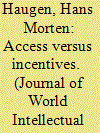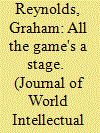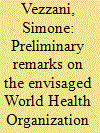|
|
|
Sort Order |
|
|
|
Items / Page
|
|
|
|
|
|
|
| Srl | Item |
| 1 |
ID:
100069


|
|
|
|
|
| Publication |
2010.
|
| Summary/Abstract |
Concerns have been expressed over the role of the World Intellectual Property Organization (WIPO) in influencing the intellectual property policies of other specialized agencies of the United Nations. This article reviews the policies of the Food and Agricultural Organization (FAO), World Health Organization (WHO) and United Nations Educational, Scientific and Cultural Organization (UNESCO), in addition to WIPO itself, and finds very interesting patterns of cooperation. While intellectual property law is primarily concerned with providing incentives for the production of new, creative and applicable arts and knowledge, human rights law is primarily concerned with providing improved access to goods crucial for human well-being and survival. While UNESCO has paid less attention to intellectual property rights over the last decades, rather emphasizing cultural preservation, both FAO and WHO have increased their focus on intellectual property rights. The latter two have increased their cooperation with WIPO, but without a formal agreement with WIPO. The article finds that WIPO, as a specialized agency, has to cooperate with specialized agencies, and there is no reason to believe that the cooperation will be in the form of a "one-way" process in which WIPO instructs the other agencies. At the same time, it must be acknowledged that intellectual property rights can also hamper research, in addition to impacting on the access to the crucial goods.
|
|
|
|
|
|
|
|
|
|
|
|
|
|
|
|
| 2 |
ID:
100070


|
|
|
|
|
| Publication |
2010.
|
| Summary/Abstract |
The primary purpose of this article is to examine the extent to which Canada's copyright laws permit the creation of machinima, an art form broadly defined as the creation of films within video games. This article is structured as follows. First, it will introduce machinima, discussing its origins, its development and its social importance. Second, it will examine whether the acts of creating and distributing machinima infringe copyright in Canada. Third, it will ask whether there are any defences to copyright infringement on which machinimators (those who create machinima) can rely. This article will demonstrate that, in many cases, the creation and distribution of machinima likely infringes Canadian copyright law. Furthermore, a large percentage of machinima that are found to infringe copyright will not be protected by the fair dealing defence as it is currently being applied by Canadian courts. This article will conclude by situating the narrow issue of machinima and copyright infringement within the broader context of creativity and copyright reform in the digital age.
|
|
|
|
|
|
|
|
|
|
|
|
|
|
|
|
| 3 |
ID:
100071


|
|
|
|
|
| Publication |
2010.
|
| Summary/Abstract |
Unlike Taiwan's Patent Law, which expressly permits parallel importation, and the Trademark Law, where parallel imports have been held permissible by Taiwan courts, Taiwan's Copyright Law, after amendment in 1993, basically forbids parallel imports (articles 87(4) and 87-1). This enactment essentially creates a new distribution right for copyright owners. Since then, parallel imported copyright products have been treated as unlawful copies. Distributors of those parallel imports in Taiwan are therefore subject to both civil and criminal penalties. This article starts by covering the rules that govern parallel imports in Taiwan, their impacts on Taiwan's copyright market and assesses the role Taiwan's international trade policy played in view of its Copyright Law legislation. It also analyses the adverse effects of this ban on parallel imports on Taiwan's trade with other countries. As Taiwan joined the World Trade Organization (WTO) in 2009, it is concluded that the ban on parallel imports may be challenged by other WTO members as an unlawful trade barrier. The existing ban under articles 87(4) and 87-1 of Taiwan's Copyright Law does not properly address the parallel imports issues or serve the objectives of Taiwan's Copyright Law. Fair-use application on a case-by-case basis should be a more adequate approach.
|
|
|
|
|
|
|
|
|
|
|
|
|
|
|
|
| 4 |
ID:
100068


|
|
|
|
|
| Publication |
2010.
|
| Summary/Abstract |
Over the last few decades, the World Health Organization (WHO) has played a significant role in the prevention and control of new strains of influenza virus in the human population. Beginning in the 1950s, it has coordinated a network of WHO-linked laboratories, charged with monitoring the changes in influenza viruses and favouring the timely sharing of virus samples, which is necessary for the development and production of vaccines. In December 2006, the said system was brought into question by Indonesia, according to which it was unfair and in conflict with the principle of state sovereignty over biological and genetic resources. Although very controversial, the Indonesian decision to interrupt the supply of candidate influenza vaccine strains boosted intergovernmental negotiation, until then not achieved, aimed at establishing a new WHO framework. This article examines the outcome of such a negotiation, as well as the aspects of the framework still under discussion. It emphasizes the innovative nature of the proposed benefit-sharing mechanism, which would promote access to vaccines mainly through the multilateralization of intellectual property rights governance. Similarities and differences between the envisaged framework and the benefit-sharing mechanism established by the Food and Agricultural Organization International Treaty on Plant Genetic Resources for Food and Agriculture in the field of access to plant genetic resources are analysed.
|
|
|
|
|
|
|
|
|
|
|
|
|
|
|
|
|
|
|
|
|